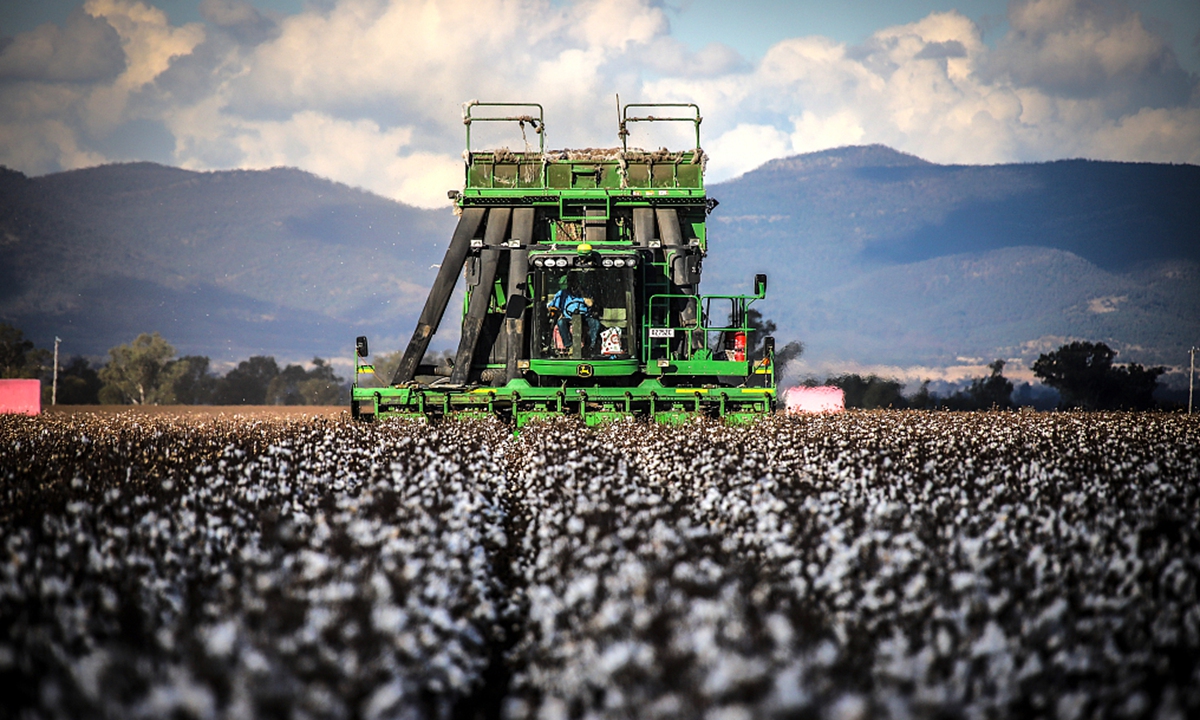
Australia cotton Photo:VCG
Australian cotton exports to China have resumed in recent days, following the arrival of Australian coking
coal in a southern Chinese port in early February, the Global Times learned, amid multiple improving signs in bilateral economic relations. Industry insiders and observers urged the Australian side to seize the momentum, take more substantive moves to repair Chinese traders' confidence and inject more positivity into bilateral cooperation.
Approximately several thousand tons of Australian cotton recently arrived in the Qingdao port, East China's Shandong Province, and were delivered to Chinese clients, a manager surnamed Chen of a cotton trading agency based in Qingdao told the Global Times on Monday.
"Relevant procedures started in December last year. But the Australian cotton shipment was still very small in terms of import volume, compared with three years ago before bilateral relations froze," Chen said. According to him, the resumption is still at an early stage as some Chinese companies are adopting a wait-and-see attitude on Australian cotton, citing concerns that "geopolitical clouds hanging over bilateral relations have yet to be fully removed."
As such, industry insiders called for more decisive measures from the Australian side to further channel positivity into bilateral relations, which could serve to allay Chinese traders' worries.
Currently, most Chinese clients import bulk shipments of cotton from the US and Brazil, according to Chen. It is estimated that cotton from Australia only accounts for around 5 percent of China's total cotton imports, declining from 20 percent in 2019, after former Australian prime minister Scott Morrison sabotaged bilateral relations.
China, the world's largest cotton consumer, used to buy 70 percent of Australia's cotton supply, according to media reports. China imported 20,000 tons of Australian cotton in 2022, compared with nearly 400,000 in 2019, official data from Chinese customs showed. That translated to a 95 percent drop over the past three years.
The resumption of cotton imports comes on the heels of Australian
coal, and it is widely expected that a wide range of Australian goods such as hay, timber and wine will gradually make a comeback, after having lost ground in the Chinese market amid frayed bilateral relations since 2020, during which time Chinese companies actively sought alternative sources of supply to reduce risks.
On February 8, the first shipment of Australian coking
coal arrived at a port in Zhanjiang, South China's Guangdong Province, and was delivered to a local production base of Baoshan Iron & Steel Co (Baosteel) in Zhanjiang. An industry insider told the Global Times that three or four shipments of Australian coking
coal are due to arrive in China in February and March.
Analysts said the restart is in line with the overall improvement in China-Australia relations. It is also in response to the calls of Australian businesses, which suffered huge losses in the Chinese market due to strained bilateral ties.
In early February, Chinese Commerce Minister Wang Wentao and his Australian counterpart Don Farrell held video talks, the first such meeting since 2019, a substantive step in the normalization of bilateral economic relations.
Shu Jueting, a spokesperson of the Chinese Ministry of Commerce, said last week that an "important window" has opened up in the China-Australia economic and trade relationship, and both sides should work together to inject more positive factors into their cooperation.
Shu, nevertheless, called for the Australian side to work with China to "provide a fair, open and non-discriminatory business environment for Chinese companies," after Canberra reportedly plans to remove Chinese-made surveillance cameras from defense sites over so-called national security fears.
Yu Lei, chief research fellow at the research center for Pacific island countries of Liaocheng University in East China's Shandong Province, urged Australia to maintain diplomatic independence from the US and take a more pragmatic approach to its relations with China.
"The Albanese government needs in particular to guard against extreme anti-China voices, which will continue to create discord in bilateral relations," Yu told the Global Times on Monday.
In 2022, bilateral trade stood at $220.91 billion, down 3.9 percent year-on-year, according to China's General Administration of Customs. Australian exports to China fell 13.1 percent year-on-year to reach $142.09 billion last year.




